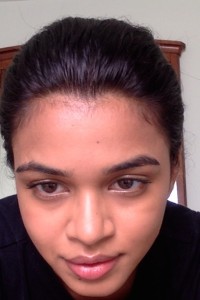 Phedra Deonarine was the Truman Capote Fellow in the Rutgers-Newark MFA in Creative Writing Program. Her work has appeared in The Indiana Review, MIEL, The Golden Key, and others. She is currently working on a short story collection, tentatively titled Fishing with Uncle Chocolate, as well as a collection of fairytales.
Phedra Deonarine was the Truman Capote Fellow in the Rutgers-Newark MFA in Creative Writing Program. Her work has appeared in The Indiana Review, MIEL, The Golden Key, and others. She is currently working on a short story collection, tentatively titled Fishing with Uncle Chocolate, as well as a collection of fairytales.
Phedra talked to Prose Editor Christopher Evans about bird-catching, paranoia, and her contribution to PRISM 54.3, the voice-driven story “San Fernando, Trinidad: School Year 1995-1996.”
One of the things that really excites me about “San Fernando, Trinidad: School Year 1995-1996” is the use of voice (the story is told from the points of view of six different characters, each with a distinct perspective and use of language). So I’m curious about where voice comes in when you’re constructing a piece. Do you hear a voice and then build actions around it? Or do you create a voice to fit an existing plot?
I wanted to show how the different characters think, so it was necessary to have each one’s interiority differ. The fact that they sound different represents different worldviews and different aspirations, and I wanted to show that difference was happening outside of their dialogue. By that, I mean that I didn’t want it to be just different accents. The characters had different approaches to similar surroundings. This is a roundabout way of saying that the voices (with the exception of the mother’s voice) had to fit the plot.
Is there a character in the story you particularly identify with?
Probably Tariq. He wants to fit in so badly, and observes all the ways in which he doesn’t (and the ways in which others do). I can understand that. If not Tariq, then possibly Kavita. This might seem odd given than Kavita fits in so very well. However, Kavita guards her position jealously. I can understand that, too.
A lot of “isms” are at play in the story—classism, sexism, religious discrimination—which also show up in some of your other writing, and often work to undermine characters’ senses of self-worth. Why are these particular types of discrimination prevalent in your work?
I suppose there’s a kind of paranoia around difference that I like to explore. I’m interested in what people want because it seems that the paranoia around difference matters most if there is some collective want. And then there is the exploration of how needlessly cruel we can be to each other. I’d like to add that even if my work shows how these forms of discrimination undermine characters’ senses of self-worth, that I myself am hopeful.
You were born and raised in Trinidad, but moved to Canada when you were eighteen. In what ways have the two countries marked your writing?
I owe my interest in birds and plants to growing up in Trinidad. My first fully-formed short story was about a bird-catcher. That came about because I grew up next to a mangrove of sorts where bird-catchers caught parakeets. Plants are appearing more and more in my work, though mostly in the speculative stories. Moving to Canada allowed me to consider studying literature and that allowed me to consider why people act and think the way they do. Living in Vancouver made me aware of houses, and land, which are common features in my stories. Both places remind me of water, which has a consistent presence in my speculative work.
While “San Fernando, Trinidad: School Year 1995-1996” is pretty much straight realism, other work of yours has a fantastical bent, either suggested (“The Offering”) or explicit (“The Princess and the River Queen”). Do you know which direction a piece is going to take when you begin, or do you just wing it and see what happens?
I know when I want the piece to have a fantastical bent, and generally I know what the basic form of that fantastical bent will be. I’m working on some more fantastical stories at present, but I haven’t said goodbye to realism either.
Are there any Trinidadian or other West Indian writers you’d like to recommend? Or any writers that have influenced your work that might not be immediately apparent?
Oh, yes! I’d recommend Kevin Jared Hosein. He’s a Trinidadian writer, based in Trinidad. I re-read Samuel Selvon’s Lonely Londoners for my qualifying exams. He’s so talented! His short story collection, Ways of Sunlight is quite good. I also like Yasunari Kawabata’s Palm of Hand Stories, Edwidge Danticat’s Breath, Eyes, Memory, Marlon James’ The Book of Night Women, and Alistair MacLeod’s “The Boat.”
Christopher Evans is the Prose Editor for PRISM international. His fiction, non-fiction, and poetry have appeared in The New Quarterly, Riddle Fence, The Canary Press, and more, and are upcoming in Isthmus and The Impressment Gang. He likes long walks on short piers.